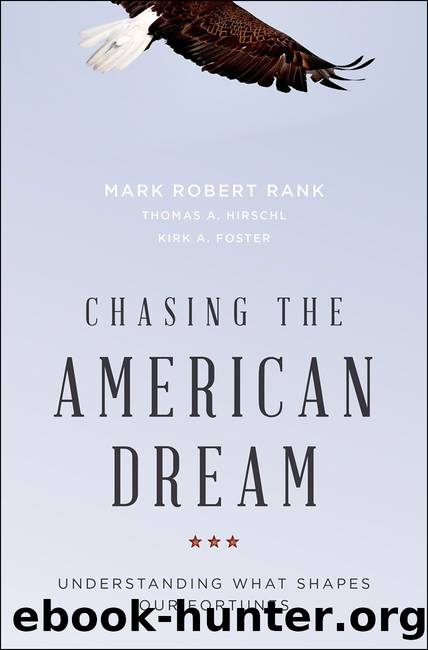Chasing the American Dream by Rank Mark Robert Hirschl Thomas A. Foster Kirk A

Author:Rank, Mark Robert, Hirschl, Thomas A., Foster, Kirk A.
Language: eng
Format: epub
Publisher: Oxford University Press, USA
Published: 2014-07-14T16:00:00+00:00
7
Cumulative Inequality
Them that’s got shall get,
Them that’s not shall lose.
So the Bible says,
And it still is news.
—Billie Holiday and Arthur Herzog, Jr., from “God Bless the Child”
Perhaps the quintessential American board game is that of Monopoly. The objective of the game is to acquire properties, build houses and hotels, collect rent, make money, and eventually put the other players out of business. The rules themselves are straightforward. Normally, each player is given $1,500 at the start of the game. The playing field is in effect level, with each of the players’ outcomes determined by the roll of the dice and by his or her own skills and judgments.
This notion of a level playing field is largely the way that we imagine the economic race in America should be run. Each individual’s outcome should be determined by his or her own skill and effort, and by taking advantage of what happens along the road of life. Our belief in equality of opportunity as a nation underlies this principle.
However, let us imagine a modified game of Monopoly, in which the players start out with quite different advantages and disadvantages, much as they do in life. Player 1 begins with $5,000 and several Monopoly properties on which houses have already built. Player 2 starts out with the standard $1,500 and no properties. Finally, Player 3 begins the game with only $250.
The question now becomes: Who will be the winners and losers in this modified game of Monopoly? Both luck and skill are still involved, but given the differing sets of resources and assets that each player begins with, these become much less important in predicting the game’s outcome. Certainly, it is possible for Player 1, with $5,000, to lose, and for Player 3, with $250, to win, but that is unlikely given the unequal allocation of money at the start of the game. Moreover, while Player 3 may win in any individual game, over the course of hundreds of games, the odds are that Player 1 will win considerably more often, even if Player 3 is much luckier and more skilled.
In addition, the way each of the three individuals are able to play the game will vary considerably. Player 1 is able to take greater chances and risks. If he or she makes several tactical mistakes, these probably will not matter much in the larger scheme of things. If Player 3 makes one such mistake, it may very well result in disaster. Player 1 will also be easily able to purchase properties and houses that Player 3 is largely locked out of. These assets, in turn, will generate further income later in the game for Player 1 and in all likelihood will result in the bankrupting of Player 3.
This analogy illustrates the concept that Americans are not beginning their lives at the same starting point (see Rank, 1994; 2004). Differences in parental incomes and resources exert a major influence over children’s ability to acquire valuable skills and education. These differences in human capital
Download
This site does not store any files on its server. We only index and link to content provided by other sites. Please contact the content providers to delete copyright contents if any and email us, we'll remove relevant links or contents immediately.
The Secret History by Donna Tartt(16627)
The Social Justice Warrior Handbook by Lisa De Pasquale(11489)
Thirteen Reasons Why by Jay Asher(7788)
This Is How You Lose Her by Junot Diaz(5774)
Weapons of Math Destruction by Cathy O'Neil(5038)
Zero to One by Peter Thiel(4824)
The Myth of the Strong Leader by Archie Brown(4789)
Promise Me, Dad by Joe Biden(4449)
Beartown by Fredrik Backman(4419)
Stone's Rules by Roger Stone(4416)
How Democracies Die by Steven Levitsky & Daniel Ziblatt(4399)
The Fire Next Time by James Baldwin(4343)
100 Deadly Skills by Clint Emerson(4079)
A Higher Loyalty: Truth, Lies, and Leadership by James Comey(4033)
Rise and Kill First by Ronen Bergman(4012)
The David Icke Guide to the Global Conspiracy (and how to end it) by David Icke(3883)
The Farm by Tom Rob Smith(3872)
Secrecy World by Jake Bernstein(3783)
The Doomsday Machine by Daniel Ellsberg(3731)
